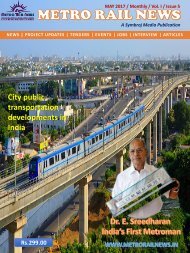Metro Rail News November 2017
Monthly magazine with special focus on Urban Mobility, Metro Rail Projects, Mass Rapid Transit Systems, High Speed Rail Project, Smart Cities Projects etc.
Monthly magazine with special focus on Urban Mobility, Metro Rail Projects, Mass Rapid Transit Systems, High Speed Rail Project, Smart Cities Projects etc.
Create successful ePaper yourself
Turn your PDF publications into a flip-book with our unique Google optimized e-Paper software.
(Picture: A typical underground metro station)<br />
construction of stations and trains, for example,<br />
should be made on the basis of full consideration of<br />
terrorist attacks; the provision of ventilation<br />
systems should include considerations of fire<br />
suppression, anthrax, and possible chemical attacks;<br />
the selection of computerized communications,<br />
CCTVs and control systems should be informed by<br />
their potential vulnerabilities and maximize their<br />
ability to continue functioning under difficult<br />
circumstances, and facilitate responses by<br />
emergency personnel.<br />
2. Incident Response Mechanism:<br />
The vulnerability of metro transit systems to<br />
terrorist attacks should be reviewed periodically<br />
throughout the operational life of a metro transit<br />
system so security officials can refine planning in<br />
response to evolving threats. For example,<br />
interagency cooperation should be encouraged and<br />
staff training should be updated. Sufficient<br />
information also must be provided to passengers so,<br />
in the event of an incident, they will know how to<br />
respond. In addition to the<br />
actions of metro transit<br />
operators and their funding<br />
agencies, police and<br />
intelligence efforts by local<br />
security agencies charged<br />
with counterterrorism<br />
should be on-going. If and<br />
when an incident occurs, the<br />
immediate response—<br />
including clearance, search,<br />
rescue, recovery, and the<br />
restoration of service—<br />
constitutes a critical stage.<br />
While these actions may last<br />
only a few weeks, they<br />
provide<br />
invaluable<br />
information for security<br />
planners as terrorist<br />
incidents are such infrequent<br />
events, deconstructing the<br />
role of system design and<br />
operations in worsening or minimizing the effects of<br />
the attack can be used to help plan and operate safer<br />
public metro transit systems in the future and<br />
provide for continuity of operations in emergency<br />
situations.<br />
3. Long-Term Recovery:<br />
The final stage in responding to a terrorist incident<br />
may last for years, and constitutes the redesign,<br />
reconstruction, and operation of the system under<br />
new rules and procedures that are influenced by the<br />
incident and what has been learned during the<br />
planning and rebuilding process. This stage also<br />
involves restoring public trust in the security of the<br />
transit system.<br />
© METRO RAIL NEWS | NOVEMBER <strong>2017</strong> | WWW.METRORAILNEWS.IN<br />
23














